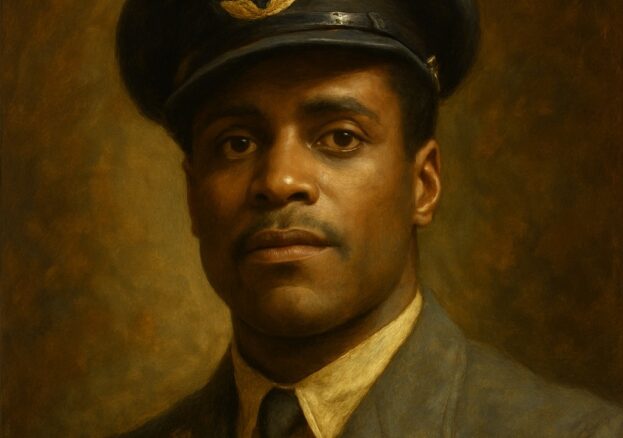
Johnny Smythe was born in Freetown, Sierra Leone, in 1915, when the country was still a British colony. He attended the Sierra Leone Grammar School and began working in the civil service. Like many young men across Britain’s colonies, he was inspired by the fight against Nazi Germany. Smythe later remembered: “I always wanted to fly. I wasn’t going to sit down and watch Hitler take over the world.” This determination led him to volunteer for the Royal Air Force in 1940.
He trained as a navigator — one of the most demanding and intellectually challenging roles in the RAF. Navigators were responsible for guiding bombers to and from their targets, often on long missions through enemy territory. Smythe was posted to No. 623 Squadron, flying Lancaster bombers.
By 1943, he had already flown 26 missions, each one fraught with danger. On one of these operations, his aircraft was hit by enemy fire and forced down over Nazi-occupied Europe. Smythe was captured by German forces and sent to a prisoner-of-war camp. He would spend the next two years in captivity, enduring hardship, poor conditions, and uncertainty about his fate. Yet he maintained a calm resolve and developed a reputation among fellow prisoners as a source of encouragement and strength.
Liberated at the end of the war in 1945, Smythe returned to Britain. Many of his comrades had not survived — RAF Bomber Command had one of the highest casualty rates of the war. His survival was a testament to both fortune and fortitude. Reflecting later, he said: “I had a wonderful war. I fought for Britain. I fought for freedom. I fought against Hitler. And I would do it all over again.”
After demobilisation, he decided to pursue a new career in law. Supported by the British colonial government, he studied at London’s Middle Temple and qualified as a barrister.

In 1948, Smythe’s life intersected with one of the defining moments of modern British history. He was appointed a senior officer on the Empire Windrush, the ship that carried hundreds of Caribbean migrants to Britain in June of that year. During the voyage, he advised passengers about the opportunities and challenges they would face in their new home. He later recalled: “On board the Windrush, I advised the men to be careful, to be respectful, and to remember they were pioneers.” His presence symbolised the link between wartime service and the post-war reshaping of Britain, as those who had fought for the country sought to help build it in peace.
After returning to Sierra Leone, Smythe built a distinguished legal career. He rose to become Attorney General of Sierra Leone and later served as a High Court Judge, playing a leading role in shaping the country’s justice system in the years after independence. His reputation was for fairness, clarity, and a deep belief in the rule of law.
In later life, Smythe’s story became more widely recognised as part of the effort to record and honour the contributions of African and Caribbean servicemen. He gave interviews about his experiences, explaining the challenges of wartime service, captivity, and the racial barriers he and others had faced. His life demonstrates how Black men and women were part of every stage of Britain’s twentieth-century journey — in wartime sacrifice, in the hopes of the Windrush generation, and in the building of independent nations.
Johnny Smythe died in 1996, remembered in both Sierra Leone and Britain as a pioneer. His story has been included in exhibitions such as the Museum of London’s Windrush collection, where his presence on the Empire Windrush is recognised as a symbolic moment in Black British history.
He remains an important figure for schools and communities today. His life shows how bravery in battle, resilience in captivity, and dedication to justice can be woven into one legacy. From the skies of Europe to the courtrooms of Sierra Leone, from a bomber navigator to a Windrush adviser, Johnny Smythe’s journey continues to inspire.
References & Further Reading
Black History Month UK – Johnny Smythe (1915–1996)
https://www.blackhistorymonth.org.uk/article/section/second-world-war-service-and-sacrifice/john-johnny-smythe-1915-1996/
Wikipedia – Johnny Smythe
https://en.wikipedia.org/wiki/Johnny_Smythe
Museum of London – Johnny Smythe
https://www.museumoflondon.org.uk/discover/johnny-smythe-raf-officer-and-windrush-passenger
Stephen Bourne – Mother Country: Britain’s Black Community on the Home Front 1939–45
https://thehistorypress.co.uk/publication/mother-country/9780750990834/
